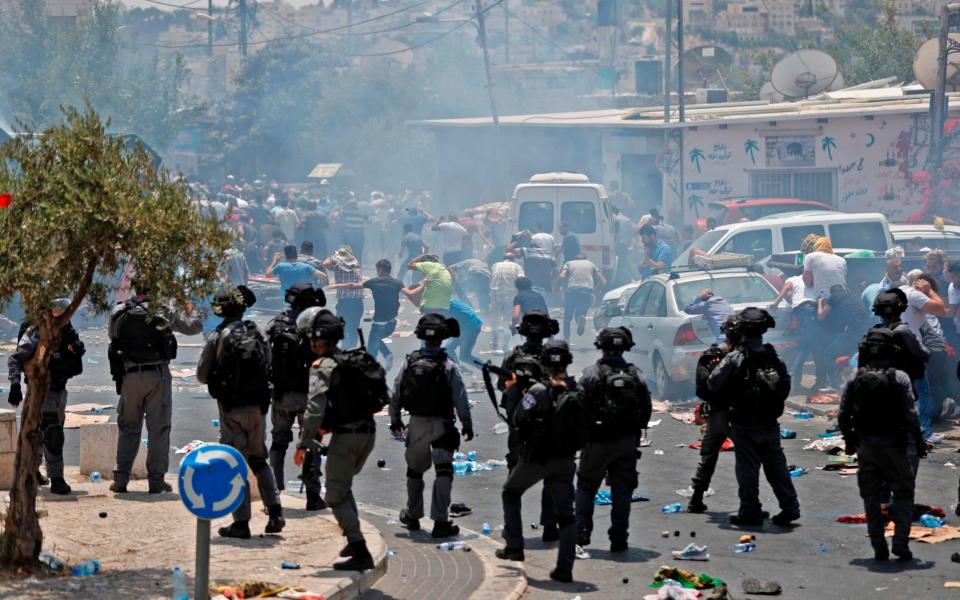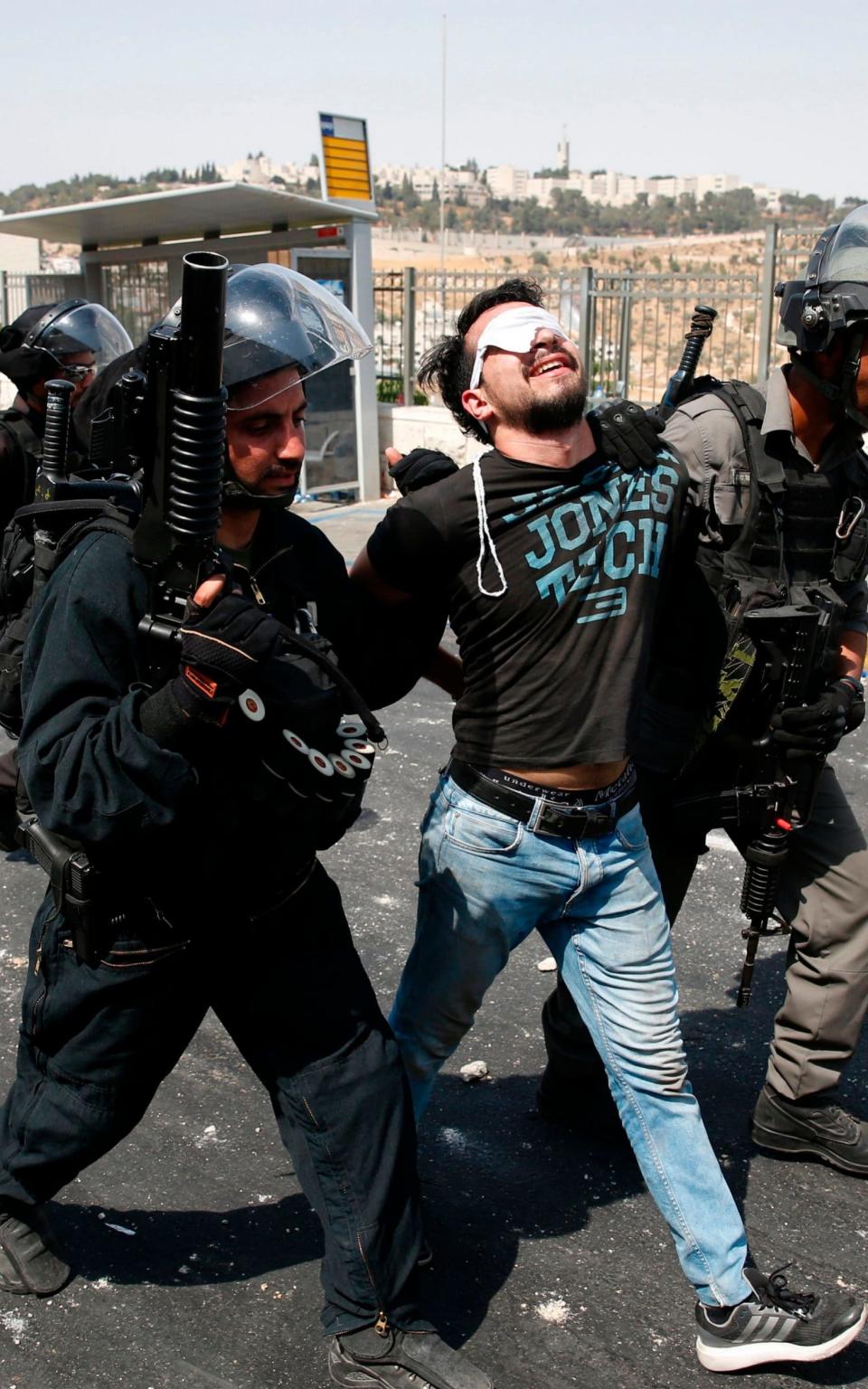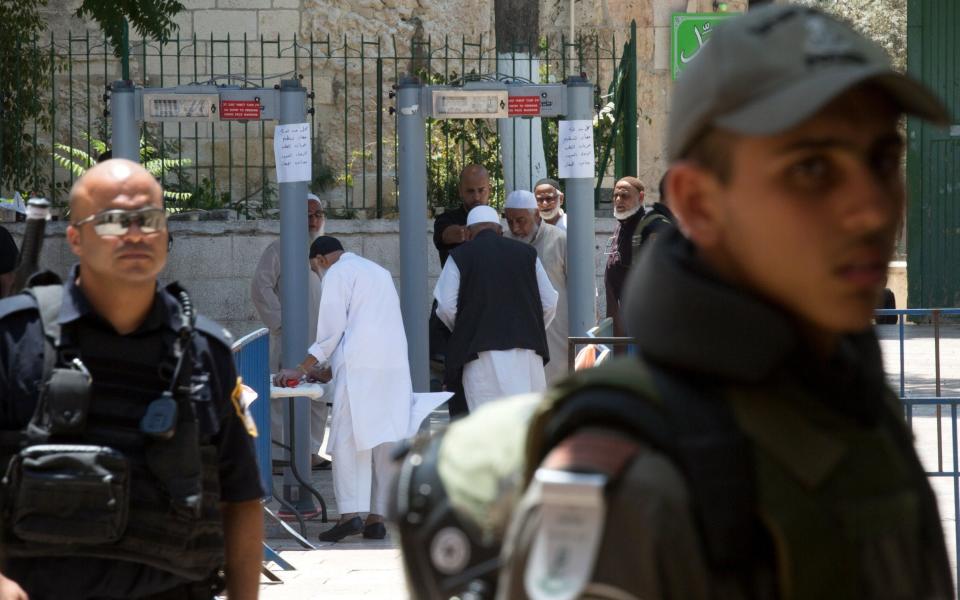Three Israelis stabbed to death in West Bank settlement after three Palestinians killed in bloody clashes

Three Israelis were stabbed to death in a West Bank settlement on Friday night hours after three Palestinians were killed during violent clashes between Israeli forces and Palestinian demonstrators.
A Palestinian attacker broke into a home in the settlement of Neve Tsuf, north of Jerusalem, and killed two men and a woman before he was shot, the Israeli military said. Another woman was wounded in the attack.
The stabbing came after thousands of young Palestinians fought street battles with Israeli security services in protest at new security Israeli measures put in place at the al-Aqsa mosque in Jerusalem.
A 17-year-old Palestinian named Mohammed Mahmoud Sharaf was killed after being shot in the neck by an Israeli settler in east Jerusalem’s Ras al-Amud neighbourhood, according to the Palestinian news agency Maan.
Another Palestinian man was killed on the Mount of Olives after being shot during a clash with Israeli police, while a third was killed in the West Bank town of Abu Dis, the Palestinian health ministry said.
The deaths on both sides are likely to inflame the already volatile situation in Jerusalem.

Israel set up metal detectors at the entrances to the al-Aqsa mosque last week after Palestinian gunmen smuggled weapons inside and used them to kill two Israeli police officers in the streets of the Old City.
But the metal detectors have sparked a major backlash from Palestinians, who see them as part of Israeli effort to assert its control over the holy site, which is also sacred to to Jews and known to Israelis as the Temple Mount.
All week Palestinian crowds have refused to pass through the metal detectors and instead have carried out their prayer services in the street outside the mosque.

“They are taking al-Aqsa from us. Without al-Aqsa we are nothing,” said one Palestinian man who joined hundreds of others to pray in the street in the 89F (31C) heat.
The prayers on Salah Ad-Din Street passed off peacefully but when they finished a group of young men gathered to chant abuse at the Israeli police. "How beautiful it is to kill soldiers, officers and border police,” they shouted.
The situation escalated as the group marched towards the police lines and soon the city streets were full of smoke from Israeli stun grenades and rubbish set on fire by Palestinians.
The standoff at al-Aqsa has echoed across the Muslim world and on Friday a group of Turkish ultra-nationalists threw stones at a Jewish synagogue in Istanbul. The White House earlier in the week said it was “very concerned” about the situation.
Israel and Jordan, which plays a role in administering the mosque, have been negotiating to try to find a compromise but so far no deal has been reached.

The Palestinian president, Mahmoud Abbas, reportedly called Jared Kushner, Donald Trump’s son-in-law, to urge him to pressure Israel to withdraw the metal detectors.
The Palestinian Authority - the semi-autonomous Palestinian government in the West Bank - said Friday it was suspending all official contact with Israel until the metal detectors were removed.
"I declare the suspension of all contacts with the Israeli side on all levels until it cancels its measures at Al-Aqsa mosque and preserves the status quo," Mr Abbas said. He has been under pressure to show he is standing up to Israel, given the widespread anger among Palestinians over the situation at al-Aqsa.
It was not clear if the suspension included the quiet security relationship between the Authority and Israel, which sees the two sides cooperate in fighting common threats.
The metal detectors are just a small part of a bigger argument over the so-called “status quo” at the holy site.
When Israel took control of the area during the 1967 war its government had to decide whether to allow Jewish worship at the site and risk inflaming tensions with Palestinians. Israel opted for a compromise: only Muslims would be allowed to pray at the site but Jews could visit at certain times and under certain restrictions.

That “status quo” has more or less held for fifty years but Palestinians are constantly vigilant of any indication that Israel is trying to take control over al-Aqsa / the Temple Mount. In the metal detectors, they see just such a sign.
“This is a humiliation to Muslims,” said Mutahhir Abu Ibrahim, a 40-year-old driver, as he stood among the crowds outside the mosque. “It’s a holy place for Muslims and Israel has no right to control it.”
Around him the growing demonstration chanted its defiance. “We will redeem al-Aqsa with our blood,” went one chant. “To Jerusalem we go, to be the martyrs of the millions,” went another.
Israeli officials point out that there are metal detectors at the Western Wall, just a few hundred yards away, and so Muslims are being asked to go through the same security screening as Jews heading to prayers. But that argument is met with contempt by protesters.
“They put them there to protect themselves. These gates are not about protecting Muslims,” said Kholoud al-Khatib, a 38-year-old woman who had travelled with her husband from the coastal city of Jaffa to protest.

